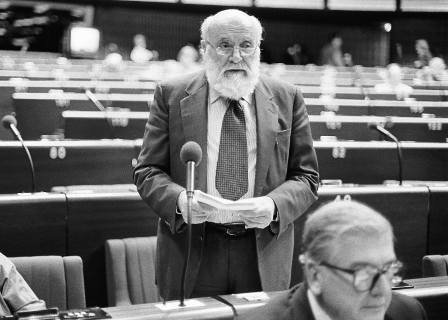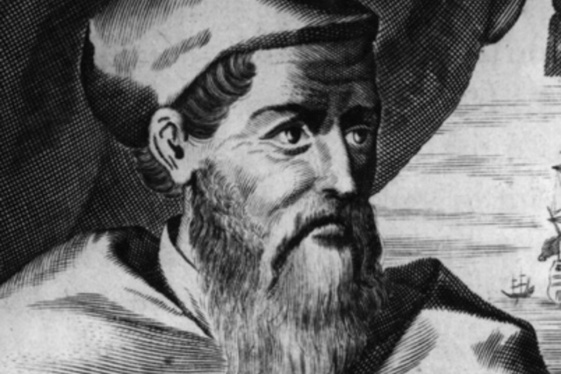

WTI Magazine #74 2015 December 11
Author : Giovanni Verde Translation by:
The first name that comes out when every European thinks about the European Union, is Altiero Spinelli. He was the one to dream a continent in harmony after being the scene of two world wars. The ideas of this Italian dreamer marked the exciting season of European integration in its infancy. His example of life and struggle has been a symbol of the power of ideas in front of the drama of violence, war, intolerance.
Altiero Spinelli was born in Rome on August 31, 1907, but spent his early years in Campinas, in Brazil, because his father was the Italian Vice-Consul in the South American country. He signs up to the Italian Communist Party in 1924, the year of the murder of Giacomo Matteotti, with Fascism now in power and the Communists forced underground. The activities of the party soon will keep him from the love of his family and he will be forced to move to Milan to escape the police. However, the attempt is useless because on June 3, 1927 Altiero is arrested because of special laws against political opponents introduced by fascism, and convicted to sixteen years and eight months in prison, after a year already passed in San Vittore jail.
In 1937 he gets transferred to Rome but, while eagerly awaiting the time of release, he receives the abrupt news of the transfer to the confinement of Ponza, a small isle in the Lazio region.
The politician is in fact confined in two different locations: in Ponza from 1937 to 1939 and in Ventotene, another small island close to Ponza, from 1939 to 1943. In those years of confinement, Spinelli is one of the few members of the Italian Communist Party to distance himself from Stalin, the Moscow Trials and the Soviet communism in general. In June 1941, during the confinement on the island of Ventotene, Spinelli, with the collaboration of Ernesto Rossi and Eugenio Colorni, writes the basic document of European federalism: the "Manifesto per un'Europa Libera e Unita" (Manifesto for a Free and United Europe), better known as "Manifesto di Ventotene".
Unlike the previous "Pan-Europa" written by Kalergi in 1922, which called for an EU led by a technocratic government, the "Manifesto di Ventotene" is the first official document that anticipates the need for the creation of a European Federation with a European Parliament universally elected by the European people and a democratic government with real power in some key areas such as economy and foreign policy.
For these reasons, Spinelli's manifesto is considered one of the founding texts of the European Union. Spinelli is released from confinement in Ventotene after the arrest of Benito Mussolini, in August 1943.
Analyzing the European catastrophe that brought to WW2, Spinelli gains the belief that only a federal organization could bring back Europe as a positive protagonist in the international framework. To serve this conviction, in 1943 Spinelli doesn't found a party, but a movement transverse to the political parties: the European Federalist Movement. In the following years, Spinelli is also co-founder of the Union of European Federalists, member of the European Commission from 1970 to 1976, then of the Italian Parliament in 1976, and then of the first European Parliament elected by universal suffrage in 1979.
He also is promoter of a draft Treaty establishing a European Union with marked federal characteristics, adopted by the European Parliament in 1984. This project significantly affects the first attempt of a profound revision of the treaties establishing the EEC and Euratom.
As one of the main political actors on the European stage, Spinelli remains member of the European Parliament for ten years. He dies in Rome on May 23, 1986. Even today, his vision of Europe, his idea of integration of the different European peoples, the substance of his democratic design are a constant inspiration to all those who believe and work for a Europe united and at the same time protagonist in an international context which is both complex and precarious.
You may be interested
-
Great Italians of the Past: A Christmas Eve...
Did you know that Christmas isn’t just a day but it’s a frame of mind?! And it’s to celebr...
-
Great Italians of the Past: Adriano Olivetti
WTI Magazine #79 2016 May 13Author : Giovanni Verde Translation by: An extr...
-
Great Italians of the Past: Alda Merini
WTI Magazine #61 2015 May, 29Author : Giovanni Verde Translation by: A torment...
-
Great Italians of the Past: Alessandro Volta
WTI Magazine #85 2016 November 21Author : Giovanni Verde Translation by: Th...
-
Great Italians of the Past: Amedeo Modigliani
WTI Magazine #67 2015 September, 4Author : Giovanni Verde Translation by: S...
-
Great Italians of the past: Amerigo Vespucci
Despite being less "famous" than Christopher Columbus, Amerigo Vespucci is the Italian who...
-
Great Italians of the past: Anna Magnani
Anna Magnani was the anti-diva par excellence, the female icon of the neorealism. Among th...
-
Great Italians of the Past: Anna Maria Mozzon...
WTI Magazine #26 2014 Apr, 18Author : Giuseppina Salzano e Giovanni Verde Trans...













